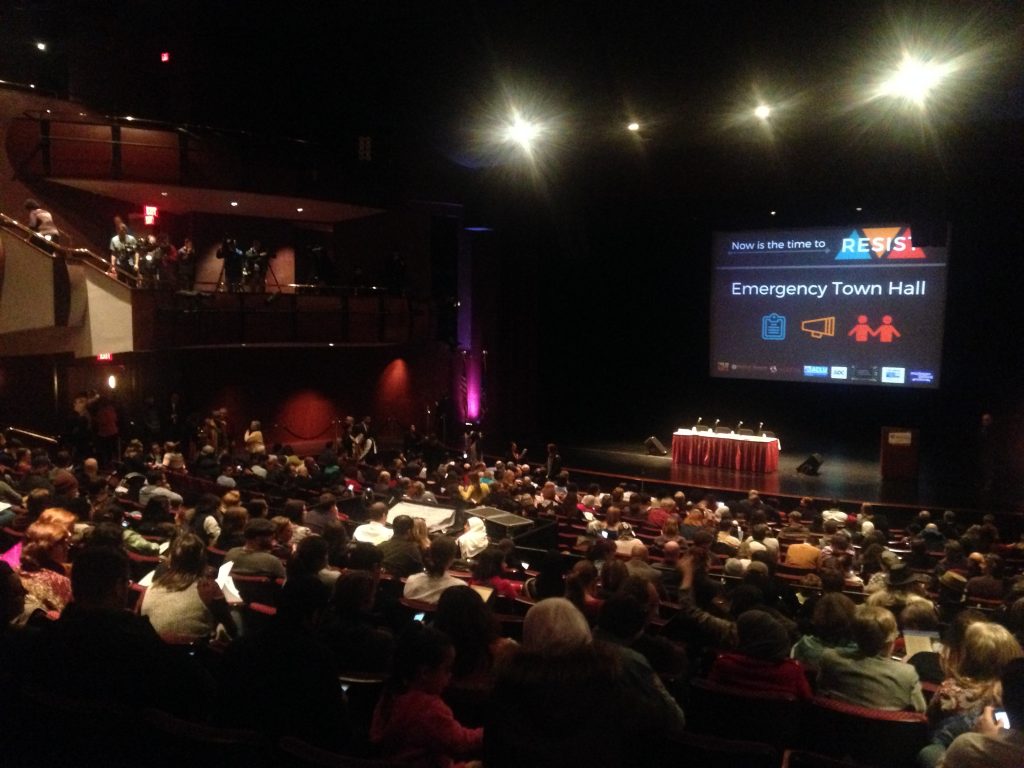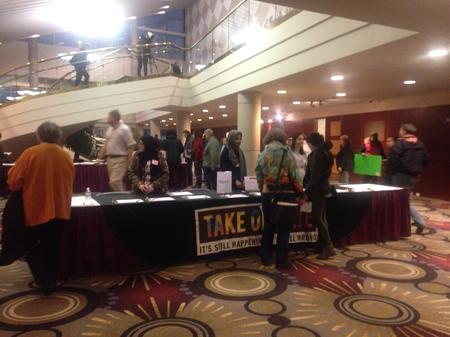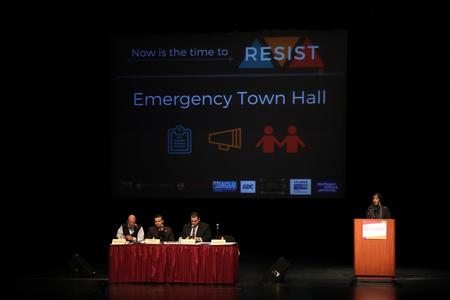Dearborn “Emergency” Town Hall on Immigration Draws a Crowd
President Trump’s executive order restricting immigration was the focus.


Hundreds of people crowded Dearborn’s Ford Community and Performing Arts Center Wednesday evening where they learned about how President Trump’s executive order on immigration will impact their communities and how they can fight to have it overturned.
“The next steps are for community members to reach out to elected officials to let them know what their stance is,” said Asha Noor, who moderated the event. “Phone banking, traditional grassroots organizing, equipping themselves with the knowledge and resources to navigate all of this.”
Some attending said they were there in solidarity for people affected by the order, while others came with stories or questions about its impact on their lives. The panelists, all attorneys, cautioned audience members against asking personal legal questions at the public forum, warning about privacy and the possibility of authorities using the information in the future.
Many people in attendance wanted guidance on what they can do to oppose the order. One woman said she, like most people, is busy and can’t attend every march. “What is the most effective way?” she asked. “If I just write a letter (to a Congressional representative), is that just being read by an intern and thrown away?”
Panelist Noel Saleh, an Ann Arbor attorney with the ACLU of Michigan, said all the calls and letters add up. “No one of us, no one organization is going to be able to be successful,” he said. “It is the cumulative effort. We do individually, organizationally, what we can do, so that collectively we’re successful in the end.”
Democratic Congressman Dan Kildee, from Flint, attended and spoke from the stage. “This is not about the security of a nation, but the insecurity of a singe individual,” he said.
The Order
Last week, Trump’s order barred travelers from seven countries — Iraq, Iran, Libya, Somalia, Sudan, Syria and Yemen — from entering the United States for 90 days. It also suspended refugee admissions for 120 days and capped the number of refugees allowed into the United States in 2017.
Read the full text of the executive order here.
Michigan has been the first destination for more than 25,000 refugees from six of the seven countries during the last 15 years. See data about them here. Michigan also is home to a large population of people from the Middle East and the metro Detroit area has dozens of mosques.
Organizers at the event referred to the executive order as a “Muslim ban.” One man in attendance asked, “How can you call it a Muslim ban when none of the five largest Muslim-populated countries in the world are on the list?”
Attorney Khaled Beydoun, an associate professor at the University of Detroit Mercy School of Law, answered that the seven countries are majority-Muslim nations. Beydoun, who also is affiliated with the University of California-Berkeley Islamophobia Research & Documentation Project, said Trump, during his campaign, called it a “Muslim ban.”
Several people made comments or asked questions about how the executive order would be applied by federal authorities. The speakers said the order contains a lot of ambiguity and how parts of it will be carried out can’t be predicted.
One woman asked, “Are they allowed to take away American passports if the passport holders are dual citizens?” She described how her mother and aunt, who hold American passports, had them taken away. Passports, Saleh explained, are legally U.S. government property, but taking them did not mean citizenship had been stripped.

Fatimah Farooq brought the discussion back to race relations in the United States between African Americans and whites. “We talk about Islamophobia but not anti-blackness,” she said. “I see a lot of people in this room, but how many would show up to a Black Lives Matter protest? As a black, Sudanese-American woman, where is the support for that? For those people who fall in the cracks?”
Moderator Noor said that, as the only black person on stage, she’d take the question. “Black issues are Muslim issues, and Muslim issues are black issues,” she said to applause from the crowd.
Organized by Take on Hate, the National Network for Arab American Communities, ACCESS, the ACLU of Michigan, the American-Arab Anti-Discrimination Committee and the Islamophobia Research and Documentation Project, the town hall meeting lasted about three hours.
WDET’s Laura Herberg and Eli Newman reported from the town hall meeting.
Here’s more of WDET’s coverage of community reaction to the executive order:
Thousands protested in Hamtramck, at Detroit Metro Airport and in Ann Arbor, Dearborn and Grand Rapids.
The Detroit City Council passed a resolution opposing the executive order.
Gov. Rick Snyder issued a statement about the order, but he did not say whether he opposes or supports it.
The Dearborn-based Arab-American Civil Rights League and six individuals filed a federal lawsuit in Detroit, asking a judge to overturn the executive order.

